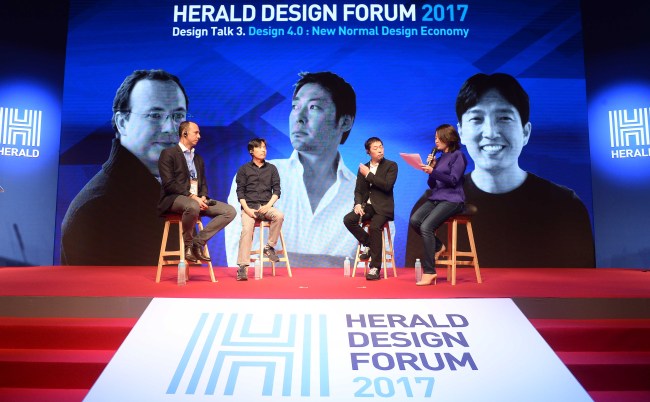[Herald Design Forum 2017] Design guru share views on technology
By Shin Ji-hyePublished : Nov. 7, 2017 - 21:43
Design gurus from Korea, Japan and the US shared their thoughts on technology during a talk session of the Herald Design Forum 2017 that took place Tuesday in Seoul.
Lampix CEO George Popescu, Daylight’s creative director Sung Jung-gi and Balmuda CEO Gen Terao came to the stage with moderator Kim Ji-hyun, editor-in-chief of The Investor, during a Design Talk session under the theme, design in the “new normal era,” leading changes in the future.
Asked how they viewed technology from a design perspective, the three experts elaborated on the critical roles of technology in design.
The chief of Japan’s popular appliances maker Balmuda said, “I am thinking about technology every day, although there is nothing I can do except not giving up.”
Lampix CEO George Popescu, Daylight’s creative director Sung Jung-gi and Balmuda CEO Gen Terao came to the stage with moderator Kim Ji-hyun, editor-in-chief of The Investor, during a Design Talk session under the theme, design in the “new normal era,” leading changes in the future.
Asked how they viewed technology from a design perspective, the three experts elaborated on the critical roles of technology in design.
The chief of Japan’s popular appliances maker Balmuda said, “I am thinking about technology every day, although there is nothing I can do except not giving up.”

Terao said the firm has been focusing on new technologies such as artificial intelligence, robotics and Internet of Things to brace for the new era of technology integration.
“We have been hiring AI specialists since three years ago and we will unveil high-tech lineups next year,” Terao said without disclosing further details.
Creative director Sung expressed concerns about the technological advances while admitting their importance.
“We try hard not to let technologies lead. Putting technology at the forefront will raise concerns that it may govern the world,” he said.
Unlike the two other design experts on stage with him, Sung warned against technological advances and following conveniences.
He is opting, rather, for designing inconvenient products such as a trash can with a net or shampoo that splashes water on users when they turn on the tap too strongly.
When asked why he keeps making inconvenient products, he said that designers should be able to look at different sides.
“What I found as a leader from my team is that they only opt for convenience (when designing a product). If there is inconvenience, they do not even look at it. However, such bias is not good for designers who should have broader views.”
He said he is now into “full design,” that bucks the trend of becoming slender and sexy.
“Most cup designs we use now are sleek and thin. However, the sexier and more beautiful cups will only make your body fat.”
He explained the sexy-shaped Coca-Cola bottle does not guarantee a slender body for consumers.
He said he wants to become a concept designer who can design people’s mind.
Popescu views technology as clay as it can double what we can make. Good user interface and user experience can be applied to all devices.”
He said we should no longer ignore the critical roles of technologies for design.
“Learning technology is now like learning writing. You can live without knowing how to write, but it can significantly limit your living. It is impossible to imagine our children ignorant of technologies.”
Augmented reality expert Popescu said the technology will increase its presence in our daily activities, including work, home, entertainment and shopping.
Augmented reality has more potential than virtual reality in that it provides more realistic experiences for user, he said.
Asked for advice on how to make a startup successful, Popescu said it is important to keep your mentality sound, saying, “You should never think you are going to fail.”
“Even if you don’t have a product, you should find a customer first and you will have business. Narrow down your idea after testing it in the market several times.”
He conveyed his experience of establishing Boston Technologies Group as a founder and taking it from zero to $20 million in revenue without any equity investments.
By Shin Ji-hye (shinjh@heraldcorp.com)








![[Graphic News] More Koreans say they plan long-distance trips this year](http://res.heraldm.com/phpwas/restmb_idxmake.php?idx=644&simg=/content/image/2024/04/17/20240417050828_0.gif&u=)
![[KH Explains] Hyundai's full hybrid edge to pay off amid slow transition to pure EVs](http://res.heraldm.com/phpwas/restmb_idxmake.php?idx=644&simg=/content/image/2024/04/18/20240418050645_0.jpg&u=20240419100350)






![[From the Scene] Monks, Buddhists hail return of remains of Buddhas](http://res.heraldm.com/phpwas/restmb_idxmake.php?idx=652&simg=/content/image/2024/04/19/20240419050617_0.jpg&u=20240419175937)

![[KH Explains] Hyundai's full hybrid edge to pay off amid slow transition to pure EVs](http://res.heraldm.com/phpwas/restmb_idxmake.php?idx=652&simg=/content/image/2024/04/18/20240418050645_0.jpg&u=20240419100350)

![[Today’s K-pop] Illit drops debut single remix](http://res.heraldm.com/phpwas/restmb_idxmake.php?idx=642&simg=/content/image/2024/04/19/20240419050612_0.jpg&u=)